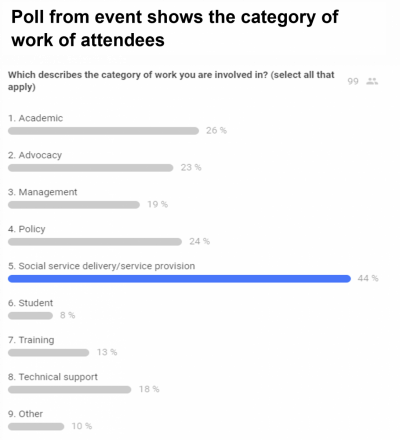
On 15th September 2021, the Global Social Service Workforce Alliance and Children and Families Across Borders co-hosted The social service workforce in and beyond the pandemic: A global conversation on adaptation, innovation and the fight for social justice.
 Over 260 participants from across the globe joined the virtual event to discuss the biggest issues facing the social service workforce. Participants stemmed from a broad range of roles and experiences—including social service practitioners, academics, students, policy makers and advocates—and had the unique opportunity to come together to discuss experiences and insights related to the impact of the pandemic on social service practice, education and training as well as on the role of the social service workforce in social justice.
Over 260 participants from across the globe joined the virtual event to discuss the biggest issues facing the social service workforce. Participants stemmed from a broad range of roles and experiences—including social service practitioners, academics, students, policy makers and advocates—and had the unique opportunity to come together to discuss experiences and insights related to the impact of the pandemic on social service practice, education and training as well as on the role of the social service workforce in social justice.
The event kicked off with opening remarks from Dr. Kathryn Wehrmann, Global Social Service Workforce Alliance Steering Committee Chair, followed by an overview of lessons learned from the Alliance's State of the Social Service Workforce Report 2020 by Global Social Service Workforce Alliance Director, Hugh Salmon. The event continued with three sessions, during which were placed into randomly assigned breakout rooms to discuss their experiences and insights with other participants from across the globe. Participants engaged in further discussion with one another by placing their key insights from their session into an interactive discussion platform, called Slido.
Session 1: Social service workforce practice in and beyond the pandemic
Dr. Heather Modlin, CEO with Amal Youth and Family Centre facilitated the first session on social service workforce practice in and beyond the pandemic. Breakout room conversations varied widely but key themes that emerged were around resilience and innovation. Dr. Modlin noted, "one of the things that stuck out from the breakout rooms were comments around having to go to work when half of your colleagues were sick with COVID.” She also highlighted comments from the breakout rooms around the difficulty of engaging and showing empathy while wearing a mask and shield everyday.
Other comments that emerged from the Slido forum included:
- “In South Africa we had challenges with students and community members not having equal access to internet or devices. So the digital divide was highlighted.”
- “[Personal protetive equipment] presented several problems - not only wearing it for long periods, but also creating barriers affecting non-verbal communication and difficulties for those with hearing impairments.”
- “[Social workers] not prioritized for vaccination.”
- “Ethical use of technology is also a very important aspect that was highlighted in [South Africa]. So our Council for Service Professions had guidelines published during Covid-19 for ethical use of technology.”
Session 2: Social service workforce education and training in and beyond the pandemic
Dr. Prospera Tedam, Professor at United Arab Emirates University, facilitated the second session on social service workforce education and training in and beyond the pandemic. Prospera noted, “one of the key things in the breakout rooms was that there was significant concern about whether practitioners feel ready, able and prepared…after taking a series of online placements.” She also mentioned that she heard concerns about the availability of the internet being equitable across populations as well as concerns about students being able to finance their education in these unprecedented circumstances.
Other comments that emerged from the Slido forum included:
- “I'm concerned for upcoming social workers and if they will feel as prepared after a 2 year graduate program in social work if they never really had field experience... I'm wondering how schools are actually managing this to prepare the new cohorts of social workers?”
- “I fear that for some, the inability to secure social work education placements has had major financial repercussions – I heard from a fellow student that having to extend their studies has meant they have to pay additional semesters' tuition.”
- “The virtual education methods in Colombia have not been effective, they do not recognise the social, cultural and economic context of girls, boys, adolescents and young people, thus increasing the levels of school dropout.”
Session 3: Role of the social service workforce in advancing social justice
Dr. Vishanthie Sewpaul, Emeritus Professor at the University of KwaZulu Natal, South Africa, facilitated the third session on the role of social service workforce in advancing social justice. She noted that during the breakout room discussions she heard themes around the importance of dealing with the root causes of social injustices as well as the importance of empowerment. She further highlighted comments from participants around the exacerbation of the digital divide during the pandemic and how that intensified social injustice, specifically noting that often more vulnerable populations without social protection were stuck in their choices to stay at home and risk starvation or go out and have the possibility of getting COVID-19.
Other comments that emerged from the Slido forum included:
- “Social work intervention methods, especially group work and community development can play important role in starting social justice initiatives.”
- “Understanding our own biases could be an important first step to a deeper understanding of entrenched injustices, discrimination at the societal level. How much does social work education/professional development of social service practitioners focus on helping identify our own biases, beliefs?”
- “Individuals create structures and systems that perpetuate discrimination and injustice that cause poverty, etc... social workers work with people, but typically those impacted by that injustice. How can we work more with those individuals causing the injustice?”
Missed the event? View the event recordings and PowerPoint presentations.
